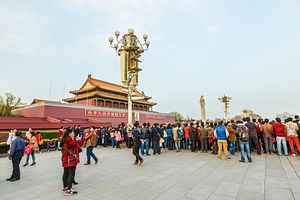It’s pretty rare to get good, hard data on political leanings in China. Aside from the biases of government and Communist Party-led institutions, there are problems relating to people’s unwillingness to discuss political issues (most likely a leftover from times when political discussions were dangerous) and a distrust of institutions in general.
Polling, in general, is a tough ask, but it isn’t impossible. Large enough sample sizes and rigorous analysis can go a long way toward remedying some of those deficiencies, and a recent paper by Harvard and MIT researchers does a pretty good job of outlining and analyzing where people of various locations and demographics stand on the Chinese political spectrum, based on over 170,000 entries on a voluntary online political survey.
First things first though – when the survey uses terms like “left” and “right” be aware they don’t correspond with the Western notions. Loosely speaking, in China the left’s policies are more traditional and Maoist, emphasizing nationalism, a strong state, and unity. The right is more open toward the free market and Western values, and is the side that defends human rights. In the U.S., someone on the left would be expected to support same-sex marriage; in China, the situation is reversed, as it is the right that is pushing for social change.
So to present some of the interesting discoveries and results of the survey questions, bearing in mind the limitations of a voluntary online survey:
- Wealth correlates strongly with right-leaning free market policies
- Less developed regions such as Xinjiang, Inner Mongolia, Jiangxi, Henan and Hunan (Mao’s birthplace) are more likely to lean left
- Slightly more than half respondents would disagree with seizing Taiwan by force
- A majority do not think the State should set minimum wages; however, a majority does feel that the State should step in if the price of pork goes too high
- A whopping 79 percent feel that in sectors crucial to the country’s economy, security, or people’s livelihoods State-owned enterprise should retain control
- A majority feel foreign capital should be treated differently than local capital
- 75 percent feel modern society does not need Confucianism
- More than half of the respondents feel traditional Chinese medicine is superior to modern medical science
- More than half of the respondents support the one-child policy
There is quite a mixed bag of responses, as usual, indicating that Chinese views are far from uniform. The strong support for State-owned enterprises controlling crucial aspects of the country seem at odds with the widespread media discussion over the necessity of reducing the power of SOEs in order to move ahead with market reforms China desperately needs.
Plenty of respondents can in the same breath support traditional Chinese medicine while distancing themselves from the dominant traditional philosophy of Confucianism. Most people reject State control over minimum wages, yet the majority supports efforts to control pork prices, indicating nuanced views on a variety of economic issues (and potentially concerns over food security and economic stability for small businesses).
No doubt further research would have a wealth of interesting insights to shed on such issues.
The report is hesitant to make overarching claims, for good reason – it points out that in 2014 there seemed to be a greater trend toward conservatism, but cautions that due to data limitations this should not be over-interpreted. As it stands however, the report has some data that will no doubt prove very useful for sinologists and those with an interest in Chinese politics.
Interestingly, China’s state-run Global Times has lashed out at the academic report in an editorial in its English edition, with some rather spurious criticisms, seemingly opposed to any attempt to differentiate between political views of Chinese citizens. The piece argues that “Regional differentiation has never been a dominant factor in Chinese ideology, and there is no solid link between economic development and ideology.” The Global Times explains:
“China’s Ideological Spectrum” [the Harvard-MIT research project] has created a spurious impression of an “ideological gap” among different regions in China, which gravely contravenes both common sense and practical experience. China is led by the Chinese Communist Party and China’s political system is highly effective in the Chinese mainland with no region held as an exception. And there is no concentrated area for so-called “leftist” or “rightist” groups in China.
These statements seem to attempt to rule out any efforts to analyze whether people in various regions hold different views. But of course, the views of people in various regions can’t all be exactly identical, so the real question is variance — a concept that the editorial doesn’t seem to accept. Despite acknowledging that development has progressed further in the coastal regions (identified as more liberal in the report) than in China’s interior, Global Times also appears to adamantly refuse to countenance the idea that the circumstances of various areas might affect their political views – a basic concept that most political scientists would find very difficult to argue with.
David Dawson is an Australian writer based in Beijing, with extensive experience in Chinese state media.

































